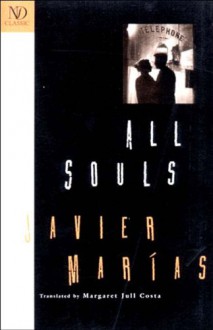With high black humor, a visiting Spanish lecturer bends his gaze over that most British of institutions, Oxford University.In All Souls, our narrator, a visiting Spanish lecturer, viewing Oxford through a prismatic detachment, is alternately amused, puzzled, delighted, and disgusted by its...
show more
With high black humor, a visiting Spanish lecturer bends his gaze over that most British of institutions, Oxford University.In All Souls, our narrator, a visiting Spanish lecturer, viewing Oxford through a prismatic detachment, is alternately amused, puzzled, delighted, and disgusted by its vagaries of human vanity. A bit lonely, not always able to see his charming but very married mistress, he casts about for activity; he barely has to teach. His stay of two years, he recalls, involved duties which "were practically nil"—"Oxford is, without a doubt, one of the cities in the world where least work gets done, where simply being is far more important than doing or even acting." Yet so much goes into that simply being: friendship, opinion-mongering, one-upmanship, finicky exchanges of favors, gossip, adultery, book-collecting, back-patting, back-stabbing. Marías has a sweet tooth for eccentricity, and his novel "crackles with deliciously sly observations of Oxford mores," as James Woodall noted in the Independent. And yet further, All Souls is a story of love within "a mysterious narrative," as The New Statesman noted, within "a turmoil of choreographical stories."
show less






 14 years ago
14 years ago